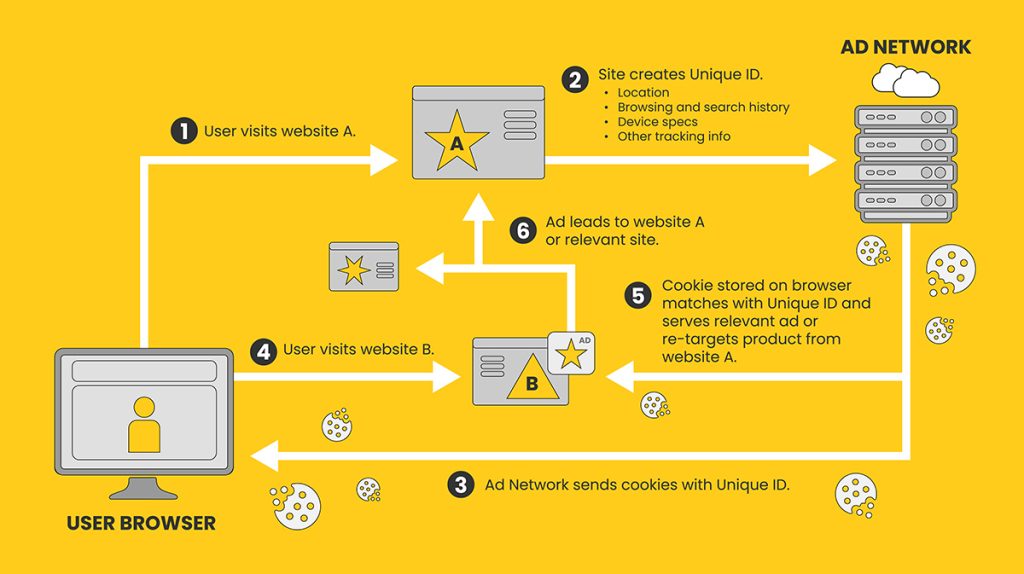And That’s the Way the Cookie Crumbles


The world of third-party cookies is a complicated one. As Google plans to sunset third-party cookies on Chrome to strengthen user data privacy by year’s end, the internet is about to get even more complex for those in the ad world.
But first, what are third-party cookies?
See infographic below.

So why are they called “cookies”?
The name derives from an existing concept called magic cookies, which are data tokens that allow servers and web browsers to communicate. The HTTP cookie as we know it today is a type of magic cookie used by websites to store information. It was created in 1994 by Lou Montulli, a 23-year-old computer programmer at Netscape. Ironically, Montulli originally designed cookies to protect people’s anonymity browsing the web. However, in the 30 years since their inception cookies have reshaped the web browsing experience entirely, becoming a central concern for data privacy.

Lou Montulli in the 1990s
But back to Google. The company claims that its decision to finally start phasing out third-party cookies is to improve user privacy. Earlier this year, they restricted third-party cookies to 1% of Chrome users globally, which equates to about 30 million users. Google will conduct a test to assess ad performance among audiences receiving ads with cookies (control group) and those for which some features are enabled, disabled, or configured (experimental group). These configured features will utilize API tools from Google's Privacy Sandbox, which is their alternative tracking solution – more to come on what this is.
Google’s intention to deprecate third-party cookies has been known for some time. But some will argue that this initiative is long overdue and well behind the progressiveness of other web browsers like Safari and Firefox, which disabled third-party cookies back in 2020. Also, Apple has blocked third-party cookies with its Intelligent Tracking Prevention feature, positioning itself as a privacy-first company and costing Meta $10 billion in revenue in 2022. Google initially wanted to start eliminating third-party cookies in 2019, however it has delayed actual implementation twice, primarily to continue testing their Privacy Sandbox APIs. Chrome accounts for 66.42% of desktop browser market share in the U.S., so this implementation will impact a large portion of the internet. However, will Google follow through this time?
In a global survey conducted by Forrester, which was fielded at the end of 2022, 51% of marketers surveyed did not believe that Google would deprecate third-party cookies. But that survey was taken more than a year ago, before Google started to walk the walk. We are sure those surveyed would have more confidence in Google now, but with antitrust lawsuits pending and regulatory investigations filed against Google, we may experience another delay.
The U.S. Justice Department and a coalition of states have filed lawsuits against Google, accusing the company of monopolizing the digital advertising market. The European Union and Great Britain’s Competition and Markets Authority (CMA) are continuing their investigation into Google’s Tracking Protection (a feature that blocks third-party cookies by default) due to potential anti-competitive practices. If Google isn’t able to hurdle all of these regulatory barriers, another postponement is imminent.
Clearly, an underlying incentive to phase out third-party cookies is also in their best financial interest. Google has paid out hundreds of millions of dollars in user privacy lawsuits, so by enhancing user privacy, they seek to protect themselves from future litigation.
With a fair chance of another delay, should you continue to postpone your plans for a cookie-less future? Absolutely not. The following stakeholders will be greatly impacted by the deprecation of third-party cookies:
- Users: While the intent is to enhance user privacy, the removal of third-party cookies might affect the personalization experience users are accustomed to, leading to more generic ads and content recommendations.
- Publishers: They use third-party cookies for ad tracking, audience segmentation, and custom content delivery. The removal of third-party cookies affects their ability to monetize content effectively and deliver personalized experiences.
a. Smaller publishers, which are most reliant on programmatic revenue, are most affected by cookie deprecation. Some will have to consider joining ad networks to reach a larger audience and generate enough revenue to operate. - AdTech Companies: Many provide services using third-party cookies and will need to find alternative solutions.
- Regulatory Authorities: Many third-party cookie alternatives, notably Google’s Privacy Sandbox Initiative, are under scrutiny by various regulatory bodies as certain options may pose an even greater threat to user privacy than third-party cookies.
- Small businesses: Those that rely on targeted advertising may find it challenging to adapt to new strategies, potentially affecting their ability to compete with larger competitors that have extensive first-party data and more resources to allocate towards targeting alternatives.
- Retail Media Networks: RMNs are retailer-owned advertising services that allow marketers to purchase advertising space across all digital assets owned by a retail business.
a. This is an emerging space utilized by retail and home improvement brands. They accurately target users near the purchase stage by leveraging first-party data, which will be even more valuable when third-party data is phased out. You can read more about the landscape of RMNs in our blog post. - Advertisers and Marketers: There are various alternatives to third-party cookies, but finding a single solution is unlikely. Doing your research and testing different options based on your client’s needs will be necessary to find which methods will give you the best performance.
Closing Thoughts
As we navigate this complex transition, it’s important for industry players to remain adaptable and proactive in embracing the new status quo of digital advertising. The landscape is evolving, and while challenges loom, opportunities for innovation and increased data protection are things we should all strive for. Take a second look at the table above regarding third-party cookie alternatives, do your own research, and decide which options work for you. The future of digital advertising hinges on collaborative efforts, due diligence, and a commitment to striking the balance between effective targeting strategies and user privacy.

Subscribe for
more Slant
This site is protected by reCAPTCHA and the Google Privacy Policy and Terms of Service apply.












